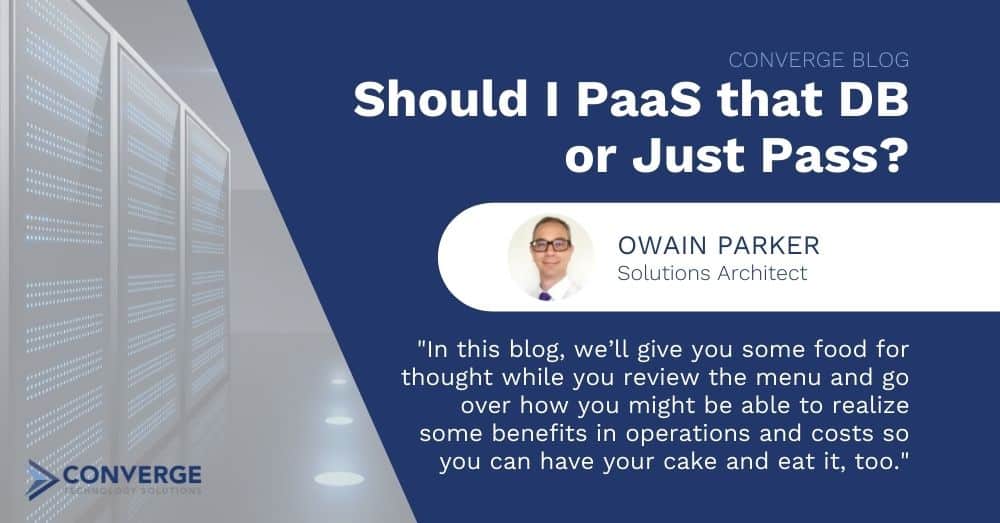Thinking about moving some database workloads to public cloud? Or already moved some? Across the public cloud providers, there is a smorgasbord of options, though it’s certainly not an all-you-can-eat buffet! In this blog, we’ll give you some food for thought while you review the menu and go over how you might be able to realize some benefits in operations and costs so you can have your cake and eat it, too.
Platform-as-a-Service (PaaS) or Database-as-a-Service (DBaaS) can offer several advantages over traditional models. Costs, manageability, scalability, redundancy, security, and other factors can all play into the decision making. It can also have some gotchas which should be considered; it’s not appropriate for every situation, and it’s not a one-size fits all.
Costs
Where can you potentially reduce your overall cost for database (DB) hosting when moving to PaaS? Licensing, for the DB of course, but also the OS, antivirus, monitoring, backup, etc. They all have licensing implications in the traditional DB hosting model. Is moving to an open-source DB an option, too?
What if you are still hosting the DB on-premises? How much is the hypervisor cost, hardware cost, rack hosting cost? Are you close to capacity in physical space, storage, compute, backup target? Could freeing up resources prevent an additional hardware purchase for expansion on-premises?
Manageability
Overall maintenance tasks should also be considered. Care and feeding for the underlying OS, keeping it patched, extending disks, reacting to alerts, checking backups, and other routine tasks all have a cost – in effort at least. Which can you displace? Can the effort be redirected to more valuable activities?
How many different skillsets are employed to manage that traditional hosting? PaaS/DBaaS can often be passed to the DBA or app owner to manage. Role-based access is a great way to pass control to teams or individuals, empowering them to be masters of their own destiny. This is especially valuable to developer groups who gain the agility to spin up, spin down, grow, shrink, clone, and test as needed.
Agility, due to improved manageability by removing the need to involve other teams in the provisioning process, can provide significant business value. Enhancing speed of execution and the ability to respond rapidly to business changes, internal or external, can deliver competitive advantages. However, don’t ignore appropriate governance and processes while doing it. Freedom to execute shouldn’t circumvent good controls for security, billing, lifecycle, etc. Use these powers for good; adjust processes, drive efficiency!
Scalability
Traditional DB hosting is often sized for worst-case scenarios or with some “just-in-case” overhead. No one wants that email or call about performance! It’s simpler to over-provision and avoid that conversation. This is often translated to IaaS; it’s not just for on-premises. What if the DB just scales to demand? Depending on the PaaS solution, this can be automated, dynamic, or scheduled. For workloads with predictable peaks and troughs in demand, scheduled scaling is a simple solution to manage costs and keep end users happy. More intelligent scaling options can be employed for unpredictable workloads, keeping those performance questions at bay.
Redundancy
SLAs are powerful tools, especially when you can hold someone else to the SLA! What about high-availability, failover, DR, replication? Depending on the PaaS/DBaaS solution, some of these features are as simple as ticking a box or just built into the base solution. No need to architect or build the extra infrastructure to acquire your required SLA. Instead, just choose the option that already has the correct or better SLA and hold the public provider accountable.
Security
Have compliance needs? Depending on the option under consideration and compliance requirements, the provider maybe able to offer the required compliance out of the box. One less thing to worry about.
With no exposed OS, there is a reduction in available attack vectors, and with patching included as the service, you can be confident that vulnerabilities are closed rapidly, sometimes even before public disclosure.
So why wouldn’t you PaaS/DBaaS?
Well, if you are hosting a back-end DB for an off the shelf app, the vendor may or may not support PaaS/DBaaS. Check with the vendor. Is it supported? When will it be supported? If it won’t be supported, why not?
Sometimes, the cloud provider you choose just doesn’t offer the DB flavor or version you need. Not much can be done there unless a change in the underlying DB is an option.
Removing some management activities also means giving up control. This isn’t acceptable for some organizations. Hands off means out of your hands. Being at the mercy of the provider to maintain SLAs, the roadmap for supportability of the product or other provider-controlled elements could discount the option. If it doesn’t align with your individual requirements, it’s not a good fit.
How can we help?
Here at Converge, our experience of evaluating, migrating, and supporting workloads across the different providers can help you navigate the options, help you determine the right fit for you, and assist as needed in making the transition to PaaS/DBaaS or any other cloud service a success for you.





